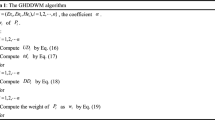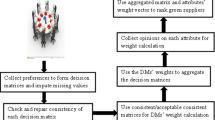Abstract
In this article, qualitative, symbolic and linguistic models for knowledge representation are presented as well as their applications. Such models are useful in decision making problems when information from the experts' knowledge is expressed through different heterogeneous types such as numerical, interval-valued, symbolic, linguistic, … The whole work proposed here takes place in a given many-valued logic. First, as an alternative to classic probabilities, a method using qualitative degrees is described and an application in supervised learning is proposed. Then we study the transformation of these degrees when they are subjected to a modification: thus we present the Generalized Symbolic Modifiers. These tools are defined as manipulations computed on a pair (degree, scale). They are grouped together into several families and thus offer many possibilities to handle uncertainty. An application in colorimetrics is described and shows the feasibility of the approach. The last point addressed in this article is the data combination. An operator called the Symbolic Weighted Median gives a summary of several qualitative degrees with associated weights. One particularity is that this median is constructed on the Generalized Symbolic Modifiers. Finally we explain how the Symbolic Weighted Median is exploited in the internal mechanism of the application in colorimetrics.
Similar content being viewed by others
References
Aït Younes A et al (2004) Image classification according to the dominant colour. In: 6th International conference on enterprise information systems, ICEIS'04. Porto, Portugal, pp 505–510
Akdag H, Khoukhi F (1994) Une approche logico-symbolique pour le traitement des connaissances nuancées. In: Proceedings of the fifth IPMU, Paris
Akdag H et al (1992) A qualitative theory of Uncertainty. Fundam Inf 17(4):333–362
Akdag H et al (2000) A symbolic approach of linguistic modifiers. In: Information Processing and Management of Uncertainty in Knowledge-Based Systems (IPMU), Madrid. Madrid, pp 1713–1719
Akdag H et al (2001) Linguistic modifiers in a symbolic framework. Int J Uncertainty Fuzziness Knowledge Based Syst 9(Suppl):49–61
Aleliunas R (1990) A summary of new normative theory of probabilistic logic. Uncertainty in artificial intelligence, vol 4 Elsevier Science, North Holland
Borgi A, Akdag H (2001) Knowledge-based supervised fuzzy-classification: an application to image processing. Ann Math Artif Intell 32:67–86
Bouchon-Meunier B (1998) Stability of linguistic modifiers compatible with a fuzzy logic. In: Uncertainty in intelligent systems, lecture notes in computer science. Springer-Verlag, Berlin, Heidelberg, New York, p 313
Bouchon-Meunier B (1995) La logique floue et ses applications. Addison-Wesley, Reading, MA
Darwiche A, Ginsberg M (1992) A symbolic generalization of probability theory. In: Proceedings of the American association for artificial intelligence. San Jose, CA
De Glas M (1987) Representation of Lukasiewicz' many-valued algebras; the atomic case. Fuzzy Sets Syst 14
De Glas M (1989) Knowledge representation in a fuzzy setting. Report 89–48, LAFORIA, University of Paris VI
Fan Z-P et al (2002) An approach to multiple attribute decision making based on fuzzy preference information alternatives. Fuzzy Sets Syst 131(1):101–106
Godo L et al (1989) MILORD: the architecture and the management of linguistically expressed uncertainty. Int J Intell Syst 4(4):471–501
Grabisch M (1997) Evaluation subjective, Méthodes, applications et Enjeux, Chap. IV. ECRIN
Herrera F, Martínez L (2001) A model based on linguistic 2-tuples for dealing with multigranularity hierarchical linguistic contexts in multiexpert decision-making. IEEE Trans Syst Man Cybern Part B: Cybern 31(2):227–234
Herrera F et al (2005) Managing non-homogeneous information in group decision making. Eur J Oper Res 166(1):115–132
Khoukhi F (1996) Approche logico-symbolique du traitement des connaissances incertaines et imprécises dans les systèmes à base de connaissances. PhD thesis, University of Reims
López de Mántaras R (1990) Approximate reasoning models. Ellis Horwood Series in Artificial Intelligence
López de Mántaras R, Arcos JL (2002) AI and music: from composition to expressive performances. AI Mag 23(3):43–57
Nef F (1989) La logique du langage naturel. Hermès
Pacholczyk D (1994) A logico-symbolic probability theory for the management of uncertainty. CCAI 11(4):417–484
Pacholczyk D, Pacholczyk JM (1996) Traitement symbolique des informations incertaines. In: Proceedings of RFIA. Nantes
Seban M (1996) Modèles théoriques en reconnaissance de forme et architecture hybride pour machine perspective. PhD thesis, University of Lyon 1
Seridi H, Akdag H (2000) A qualitative approach for processing uncertainty. Uncertainty in intelligent and information systems. vol 20 World Scientific, pp 46–57
Seridi H, Akdag H (2001) Approximate reasoning for processing uncertainty. J Adv Comput Intell 5(2):108–116
Seridi H et al (1998) Qualitative operators for dealing with uncertainty. In: Freksa C (ed) Proceedings of Fuzzy-Neuro Systems'98. München, pp 202–209
Seridi H et al (2003) Une approche qualitative sur le traitement de l'incertain: application au système expert. Sci Technol 19:13–19
Sombe L (1998) Inférences non classiques en intelligence artificielle: ebauches de comparaison sur un exemple. P.R.C.-G.R.E.C.O “Intelligence Artificielle” Hermès
Truck I (2002) Approches symbolique et floue des modificateurs linguistiques et leur lien avec l'agrégation. PhD thesis, University of Reims
Truck I, Akdag H (2003) Supervised learning using modifiers: application in colourimetrics. In: ACS/IEEE International Conference on Computer Systems and Applications, AICCSA 2003, Tunis, Tunisia
Truck I et al (2001) A symbolic approach for colourimetric alterations. In: 2nd International Conference in Fuzzy Logic and Technology (EUSFLAT 2001). Leicester, England, pp 105–108
Truck I et al (2002) Generalized modifiers as an interval scale: towards adaptive colourimetric alterations. In: The 8th Iberoamerican Conference on Artificial Intelligence, IBERAMIA 2002. Sevilla, Spain, pp 111–120
Yager RR (1994) On weighted median aggregation. Int J Uncertainty Fuzzyness Knowledge Based Syst 2:101–113
Zadeh LA (1972) A fuzzy-set-theoretic interpretation of linguistic hedges. J Cybern 2(3):4–34
Zadeh LA (1975) The concept of linguistic variable and its application in approximate reasoning. Inf Sci (I, II, III)) 8(9)
Author information
Authors and Affiliations
Additional information
Isis Truck did research in the MODECO Group in Reims (France) and received her PhD in computer science from the University of Reims in 2002. She joined the LIASD (Laboratoire d'Intelligence Artificielle de Saint-Denis) at the University Paris 8 in 2003 as an Assistant Professor. Her research interests are in the field of knowledge representation under uncertainty, especially by way of fuzzy logic and many-valued logic. She is also interested in music and computer science and participates in projects in this field.
Herman Akdag (ing. INSA LYON) obtained his PhD in computer science from the University of Paris 6 (France) in 1980, and his Professorship Diploma HDR from the same university in 1992. He is a full professor at the University of Reims. His research interests include knowledge representation, uncertainty management, fuzzy logic, machine learning and data mining. Currently, he is a researcher in artificial intelligence (LOFTI team) at the LIP6 laboratory. He is also the head of the research group MODECO at the University of Reims.
Rights and permissions
About this article
Cite this article
Truck, I., Akdag, H. Manipulation of qualitative degrees to handle uncertainty: formal models and applications. Knowl Inf Syst 9, 385–411 (2006). https://doi.org/10.1007/s10115-005-0228-3
Received:
Revised:
Accepted:
Published:
Issue Date:
DOI: https://doi.org/10.1007/s10115-005-0228-3




